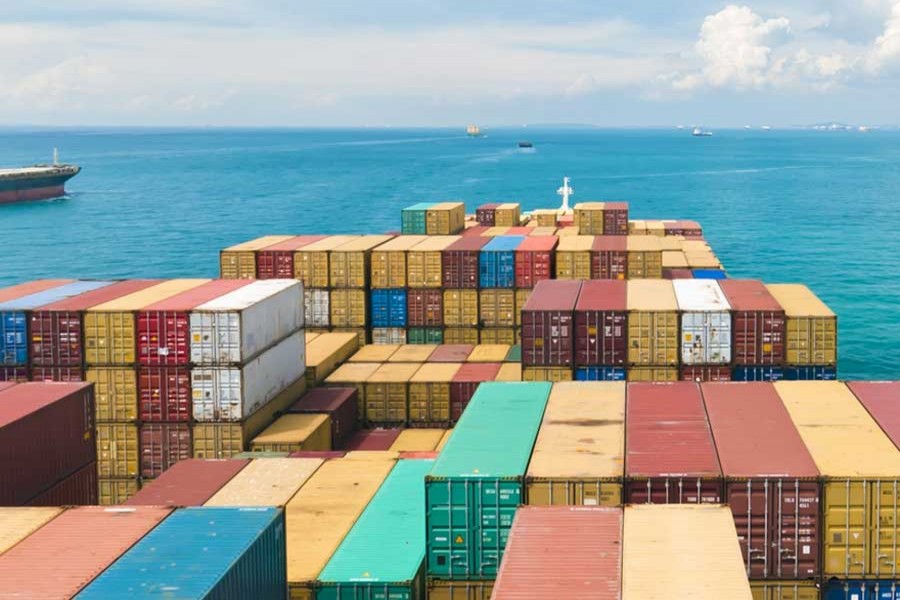
Published :
Updated :

Global trade is slowing down this year and such trend is likely to continue the next year, according to the Wold Trade Organisation (WTO). A slow growth in international trade may affect export orders for and export revenue of countries like Bangladesh.
The ongoing global trade war is also another manifestation of currency war when some trade partners devalue currency to make up for export losses and gain higher competitiveness. In such a situation, import cost of other countries is supposed to come down to the extent of foreign currency depreciation. Prices of foreign goods in the importing country should decrease but in reality they do not. On the other hand, the country's exports suffer.
Export-oriented industries depend on overseas sales for their sustenance and any decline in sales to foreign countries leaves negative impacts on those industries. The export industries that are often called 'sweat shops', help generate employment at low wages. Such low wages still support increasing purchasing power in the domestic market for trading goods and services.
Any initiative by the countries that are dependent on exports cannot reverse the global trade slowdown. However, there is an option to address the situation -- depreciation of local currency is a tool for supporting exporters. For example, the value of export of US$1 that brings local currency of 100 units, may stand at 120 units if the currency is depreciated by 20 per cent. This way of currency price setting helps exporters to remain competitive despite decline in export volume.
Currency depreciation is a common practice in export-oriented emerging economies including trading partners such as China, the largest source of Bangladesh's imports. US President Donald Trump often criticises China for its currency depreciation, calling it manipulation.
Some benefits of currency depreciation by major trading partners are visible in Bangladesh's trade volumes with them in recent years. But, the consumers always do not benefit from a supposedly lower cost of import. Importers do not feel compelled to revise downwardly the prices of imported items procured after currency depreciation in supplying country. Driven by profit motive, they rather try to lobby for continuation of stable price of the local currency.
Although stable currency regime helps importers to become rich in the short run, they eventually face the reality when purchasing power of the masses, particularly the ones employed in 'sweat shops', dwindles.
Trade is growth engine of an economy and export is considered as a generator of autonomous purchasing capacity. Domestic sectors including import-substituting industries cannot absorb huge manpower unlike what export sectors accommodate.
The present global situation marked by currency war favours importers but affects exporters. Exporters with adequate orders do not need support but a slowdown requires policy support to them for sustainability. Export subsidy and low cost finance may be such supports.
To run an industry, huge non-operating recurring expenses are required. The challenges of export industries that have characterised the present-day situation demands immediate attention.
People cannot produce all goods and services they need and under division of labour, they do specific work and earn money to buy them. So, to facilitate the transactions, money plays the role as the medium of exchange. Any deficit in demand for goods needs to be fulfilled by imported goods that require foreign currency. It is export which provides this offshore money.
Trading partners make their currency depreciated to encourage cross border sales for facilitating their export industries. The benefits of imports at depreciated price should go to importers but rarely do the consumers benefit.
Therefore, an equilibrium is required in external trading activities. Local currency value should be determined in accordance with trends in trading partner countries.
Retaining the local currency value stable without responding to change in counterparts' exchange rate, facilitates import trade and foreign currency borrowing but triggers capital flight and leaves certain costs for export sectors. Wage remitters, too, feel discouraged to use official channels for sending their hard-earned income.
Bangladesh's imports range from consumer goods to industrial raw materials and semi-processed goods. Import-substituting industries are being supported through tariff wall at the import stage. Additional support by way of overvalued local currency should boost these sectors with huge employment. But, in reality, such support hardly brings positive results.
Success stories of development through import-substituting industrialisation without basic contents are rare. The East Asian emerging economies advanced with export-led growth model. Support only to imports and other related sectors may lead to downward growth of exports and disappearance of jobs.
Any declining global trade may result in decline in export orders and employment, unless support is extended, or is readily available. Fiscal support in the form of incentives is effective but slow. In the midst of a currency war, the partner countries are following the path of devaluation to sustain their external sectors, generating inflows of money. Consequently, exporters can at least survive. The situation would have been the reverse by this time if currency depreciation didn't take place. The exporters would be required to be bailed out with borrowing support from external sources.
Imports also help create employment in export sectors. But unless local value addition is sufficient, import-substituting industries cannot create employment.
However, low value addition in 'sweat shops' can offer sufficient employment as did in the country'\s readymade garment sector. So, it requires a policy trade-off to balance the situation. In the current global context, we need to finetune the value of local currency. This will help export sectors to sustain. The government will benefit in the form of incremental income from collection of duties and taxes since import value in Taka will be relatively higher. Major benefits will surly go to export sector for sustainability.


 For all latest news, follow The Financial Express Google News channel.
For all latest news, follow The Financial Express Google News channel.